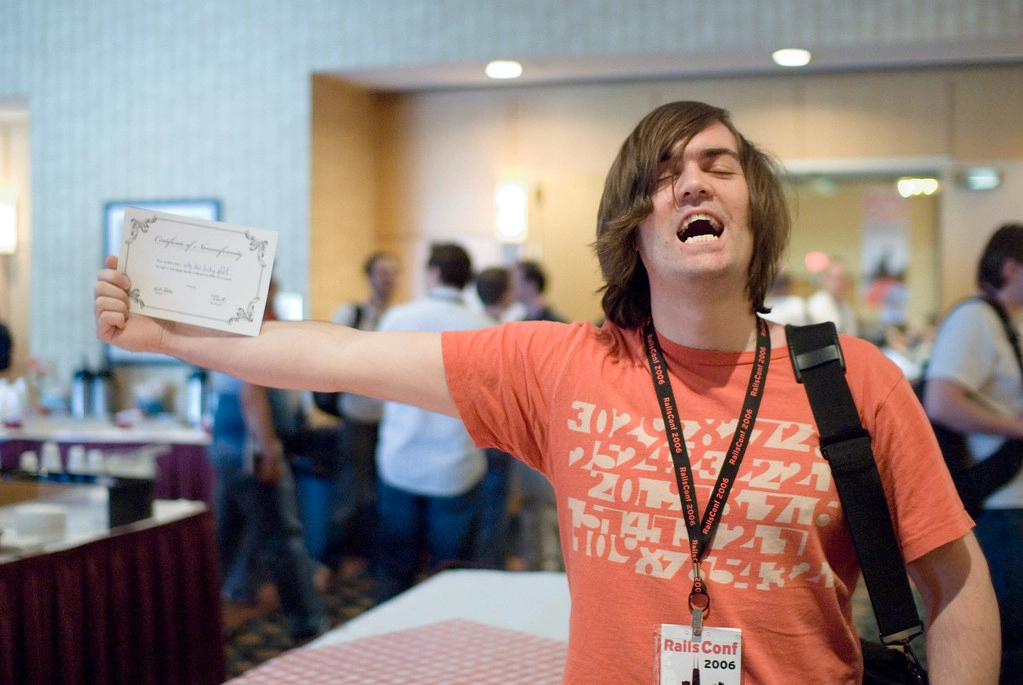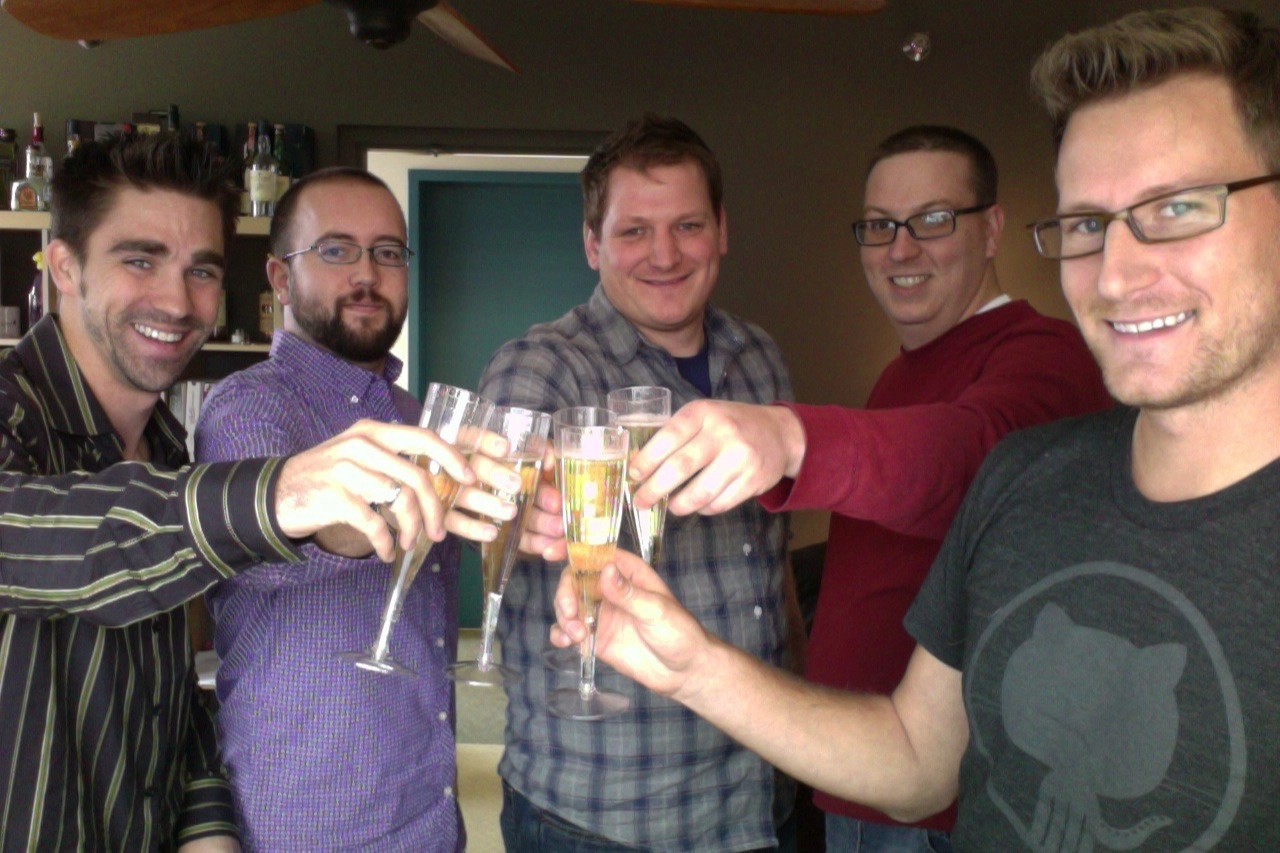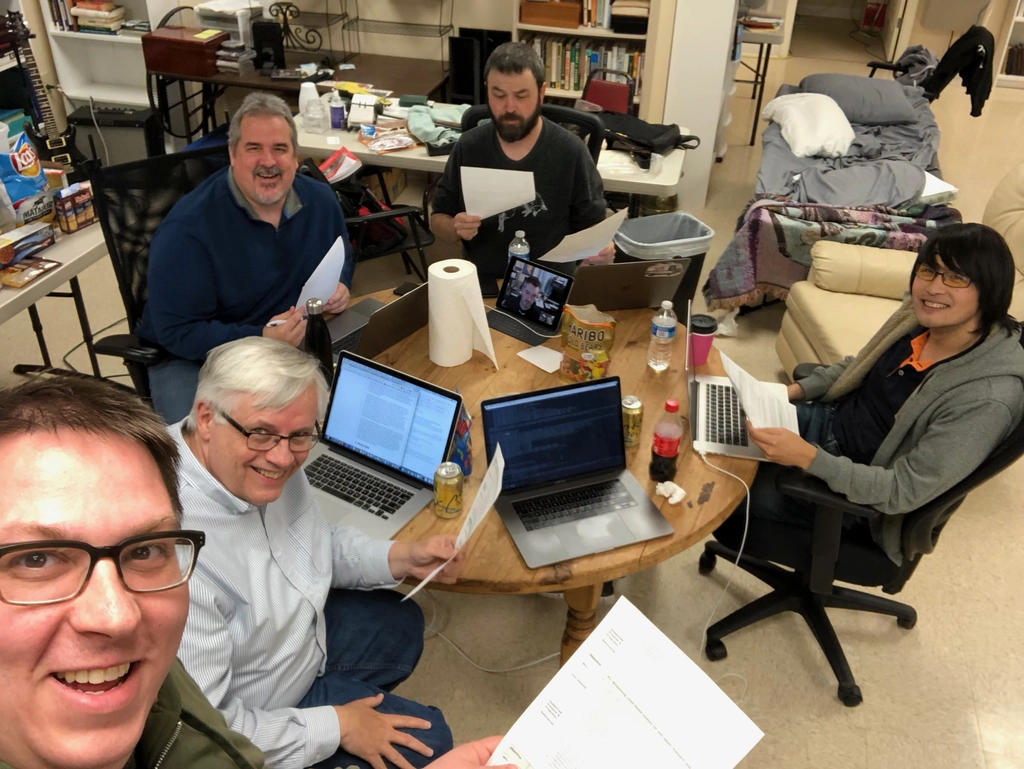Farewell RailsConf and Thank You For Everything
2006, Chicago. Nearly everyone at the first RailsConf tapped away on a MacBook, except about fifty rebels. My friend Christian Metts, who had introduced me to Rails, and I printed Certificates of Nonconformity, forged Bill Gates’ and Linus Torvalds’ signatures, and handed them to the non-MacBook crowd while Christian snapped photos of each proud hold-out, including the elusive why the lucky stiff.

That playful moment, the community, and the shared curiosity, set the tone for everything that followed.
Finding Rails & Finding My People
Like many, using Rails was the forcing function for me to learn Ruby (with help from why’s poignant guide to Ruby 🙏), and that first conference pushed me deeper. Soon after, I drove to a Ruby meetup at Notre Dame and met John Nunemaker and Steve Smith. One afternoon over beers at Fiddler’s Hearth in South Bend, they vented about SlideShare’s terrible user experience. I opened my terminal, installed ImageMagick, and hacked together a PDF-to-image converter on the spot. That bar-top prototype grew into Speaker Deck and my first RubyGem, Grim.
Building Businesses on Rails
In December 2010 I became OrderedList’s first full-time developer, joining Steve, John, and later Brandon Keepers and Matt Graham. We iterated on their first product Harmony, launched Speaker Deck to the public, and shipped Gaug.es, a Rails-based analytics tool born from our dislike of Google Analytics. Consulting gigs on products like Words With Friends paid the bills.
Through meetups and conferences our team met the GitHub co-founders and early employees such as Tim Clem and Zach Holman. In the fall of 2011 GitHub invited us to join as their first acqui-hire.

A GitHub Career
After our acquihire in late 2011, I worked my way through nearly every department at GitHub building our support software (a Rails app called Halp), integrating our business systems with the GitHub monolith, building tools for our customers to migrate between GitHub on-prem instances and our hosted instance, shipping 2fa enforcement features for our business customers, and finally landing in the Security department where I’ve been for nearly 9 years now.
Brandon, John, and I were among GitHub’s earliest users, with IDs #173, #235, and #623.
In Security I’ve built multiple Rails applications but only one of them is still in heavy use. Funny enough it’s a stream processing application where the Rails MVC has been swapped out with Consumer, Enrichment, and Detection modules to handle the majority of our automated abuse detection and remediation flows processing billions of events per day.

I still work on the GitHub Rails monolith from time to time, but new Rails apps are rare for me now, and I miss it. There’s nothing like spinning up a Rails app from scratch and going from zero to usable in minutes. Rails made it simple to focus on the business problem and get something up and running quickly with the tradeoff that scaling later may come with some headaches.
The Last RailsConf
This week in Philadelphia they are holding the last RailsConf, concluding nearly 20 years of tradition. Ruby Central is shifting focus to RubyConf and stewardship of RubyGems and Bundler, while The Rails Foundation steps into Rails stewardship via Rails World, which sold out Toronto in seconds.
DHH, creator of Rails, shares the sentiment:
“Few numbers exemplified the early growth… we bootstrapped something from nothing, turned it into an epoch‑defining event… RailsConf 2025 will be the last RailsConf… I raise my glass to the final RailsConf.”
While I haven’t been deeply involved in the Rails community recently, as I prepared this post I learned how Rails World and RubyConf are shaping Rails’ future, and I’m hopeful for the aspiring or seasoned software developer that finds Rails and it changes their life like it did mine.
A Thankful Reflection
RailsConf gave me identity, community, and confidence. But more than anything, it connected me with incredible people, from the early Rails pioneers I met at conferences to the teammates who became lifelong friends, from mentors who shaped my thinking to fellow developers who challenged me to grow. The names and faces have accumulated over nearly two decades, each person adding something meaningful to my journey. The Rails community has always understood that great software comes from great people working together.
So this last RailsConf isn’t a swan song, it’s a celebration. My professional software development journey started here, and I’m deeply grateful. Here’s to the Rails way: convention over configuration, developer productivity, and a culture of collaboration. Thank you, RailsConf, and thank you, Rails community.
One More Thing
I haven’t created a Rails app recently but I still write a lot of Ruby and share most of it as open source including my port of pocketflow to Ruby, my scripts project for AI workflows, and a few of my other projects.
Feedback
Feedback is welcome: discussions/7
Thank you for your time 🙏